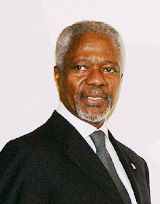UN’s Annan calls for international pressure on Eritrea
Oct 25, 2005 (UNITED NATIONS) — U.N. Secretary-General Kofi Annan urged the Security Council on Tuesday to step up the pressure on Eritrea to reverse its ban on helicopter flights by U.N. peacekeepers over its territory.
 The U.N. mission monitoring the stalled peace process between Eritrea and Ethiopia is facing “a crisis that requires the full attention of, and urgent and specific action by, the international community,” Annan told the council in a letter.
The U.N. mission monitoring the stalled peace process between Eritrea and Ethiopia is facing “a crisis that requires the full attention of, and urgent and specific action by, the international community,” Annan told the council in a letter.
The council in particular must address the underlying causes of the stalemate, including Ethiopia’s refusal to accept the border marked out by an international commission between the two Horn of Africa neighbours, the U.N. leader said.
Eritrea banned helicopters from flying in its airspace on October 5, reducing the ability of the 3,300-strong peacekeeping mission in Ethiopia and Eritrea to monitor military movements, resupply troops and conduct emergency medical evacuations.
India and Jordan, the main contributors of troops to the peacekeeping mission, complained loudly to Security Council members last week, saying the situation posed a danger to their soldiers and the council had to take firm action.
But so far the council has pursued quiet diplomacy, even after Eritrea’s president, Isaias Afewerki, rejected a personal plea from Annan that he undo the flight ban.
Afewerki, in a letter dated last Thursday, said that both Annan and the council had “forfeited your relevance” to the dispute.
Under a December 2000 peace accord ending their two-year border war that killed more than 70,000 people, Ethiopia and Eritrea agreed to accept the conclusions of an independent panel on where their shared frontier should lie.
The commission issued its findings in April 2002 and Eritrea fully accepted them.
But the process of marking out the new boundary broke down after Ethiopia objected that the flashpoint western town of Badme had been awarded to Eritrea. The border war began when Ethiopia accused Eritrea of invading Badme.
The process has been at a stalemate ever since.
Diplomats have speculated Eritrea imposed the helicopter ban to persuade the council to pressure Ethiopia to accept the commission’s findings on the border.
An Eritrean official last week urged the international community to focus on what it called Ethiopia’s illegal occupation of its territory rather than on the flight ban.
(Reuters)
